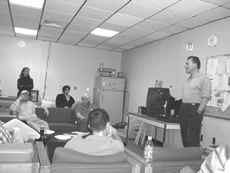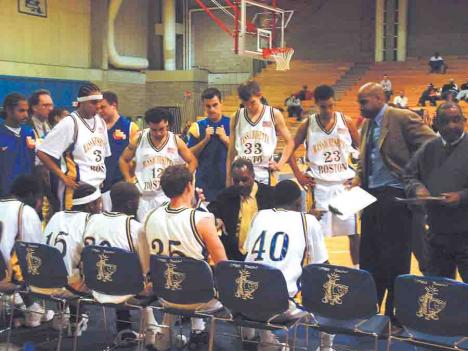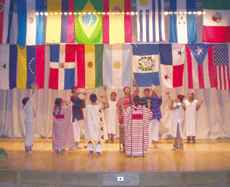Veteran’s Center Open House

Paul Atwood adresses those gathered at the Vet´s Center open house on November 15.
Veteran’s Center Open House
November 20, 2002
Since the school was closed on Veterans Day, any observance of the national holiday had to take place either before or after the actual holiday. According to Dwight Tyarks, the new coordinator for the Veteran’s Center, part of the inspiration to hold a discussion about the impending Iraq war came to him on Veterans Day when he saw a lot of vets walking around the city. Tyarks said that there is the potential for a huge amount of casualties if the U.S. decides to go to war with Iraq again, and that the veterans from this new war would be “coming back to a nation that hasn’t even taken care of the ones from the last time.”
Tyarks also said that a quote by George Washington that he recently read made him think differently about the possible war on Iraq. The quote was, “The willingness with which our young people are likely to serve in any war, no matter how justified, shall be directly proportional to how they perceive the veterans of earlier wars were treated and appreciated by their nation.”
Tyarks, himself a veteran of the Vietnam War, expressed his concern that the United States is willing to send people to Iraq when the actual physical side effects of the last war in the Middle East are barely recognized by the government. He explained how it took 20 years for Agent Orange, a powerful biological weapon used in Vietnam, to be recognized as a contaminant in the gene pools of men exposed to the chemical while serving in Vietnam. Now, many Gulf War veterans are facing a similar problem in trying to get Veterans’ Affairs to recognize “Gulf War illness.”
The event on Friday, November 15 was originally just going to be an open house, but then Tyarks decided to include a forum in the program. Tyarks worked at UMass Boston’s William Joiner Center for three and a half years, and asked Professor Paul Atwood from the Joiner Center to lead a discussion as part of the open house because he felt it was “a good forum to open up a discussion to see what the dialogue was like.”
Professor Atwood began his talk by telling those gathered for the open house a little about himself and his involvement and study of the United States military and subsequently became a student of U.S. foreign policy.
“President Bush says the issue is freedom and democracy for the Iraqi people,” Atwood said. He went on to give some history. In 1972 Iraq owned the means of oil production in their own country, prior to that the oil production had been under the control of either the U.S. or Great Britain. According to Atwood, the profits reaped from Iraqi oil production began to be used within the country and in turn the Iraqi standard of living. The Western world then began to try to find ways to get Iraq oil back under their control. Finally, he debunked Bush’s justification for involvement in Iraq by stating that there “can’t be democracy in Iraq” because it “has always been ruled by one dicatorship or another.”
Atwood also stated that the actions which the United States would undertake to remove Saddam Hussein would only be beneficial if they then imposed a new dictatorship, resulting in what he called “Saddam-ism without Saddam.”
It would be a “very, very serious mistake to go to war in Iraq,” Atwood said, not only because of the effects on Iraq but also because the U.S. would be “setting ourselves up for endless war and endless casualties.”
There was some discussion of what Atwood referred to as “chicken hawks” in the current Bush administration. “Chicken hawks” are people who never served in Vietnam themselves but were and are now again “perfectly happy to send other people to do their dirty work for them and die for them.”
A few other interesting points were made when the discussion was opened up to those present, and people began to ask questions. One person asked about the trilateral commission and what it was. Atwood replied that it was made up of leaders in the United States government, industry, and finance, and added that they can all agree “when it comes to keeping the goose that lays the golden egg.”
One student asked Atwood what people can do to oppose the war if they choose to do so. Atwood responded that it is very important for people to educate themselves on these issues and use their voices to make other people think.






















































